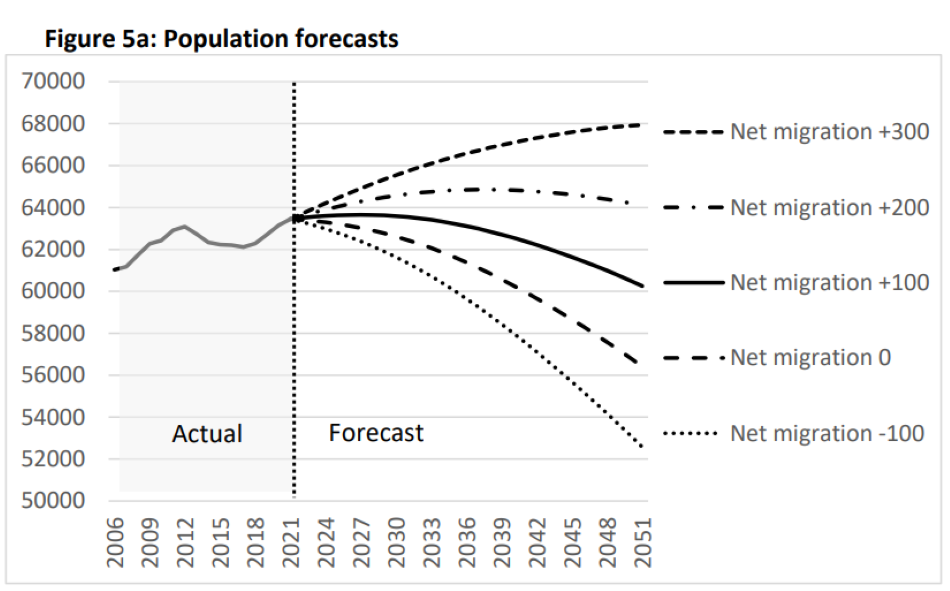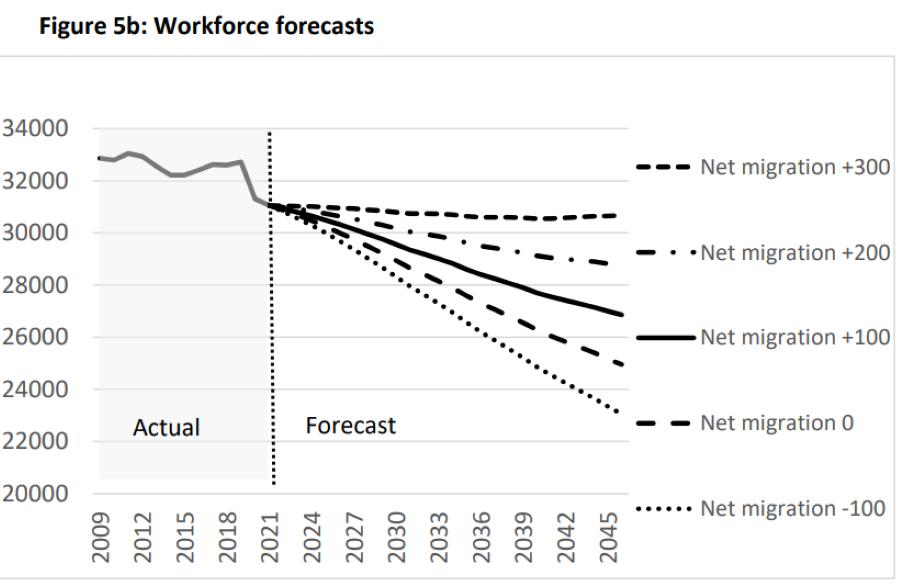


Plans to encourage more inward migration and increase Guernsey's population will face alternative proposals from Deputy Peter Roffey at next week's States' meeting.
Deputy Rob Prow's Committee for Home Affairs wants to relax population controls to prevent any reduction in the size of the workforce. It wants to change the States' strategic population policy to assume net inward migration of an average of 300 people per year - whereas it has averaged 100 a year over the past 12 years.
Deputy Roffey thinks that would put too much pressure on the island's infrastructure and quality of life.
He is finalising two amendments which will ask the States to scrap the Committee's headline proposals and instead aim for smaller increases in inward migration and no population growth in the long term alongside boosting productivity in the local workforce.

Pictured: Guernsey's population density is among the highest in the world and Deputy Peter Roffey believes that encouraging further population growth would be too detrimental to quality of life.
Deputy Roffey's first amendment will propose deleting the Committee's recommendation to aim for net inward migration of 300 people per year. Net inward migration is the number of people moving to the island minus the number leaving. Deputy Roffey wants to aim for +200 people per year instead.
The Committee estimates that this would slightly increase the island's population over the next 20 years - from around 64,000 to 65,000 - before a gradual reduction back to around 64,000 by the year 2051.
"While the correlation between the States' aspiration in respect of net migration and what actually happens in this regard may be very weak, it remains important for States' policy to reflect what the Assembly regards as desirable," said Deputy Roffey.
"The policy in the [Committee for Home Affairs'] policy letter, if realised, would lead to a very significant increase in Guernsey’s population, leading to large infrastructure challenges. These include...an aggravation of existing housing and traffic issues.
"By contrast, the policy suggested in this amendment would lead to very little increase in Guernsey’s population – roughly static over the timescale referred to.
"Maintaining the size of Guernsey’s workforce should be achieved through a combination of an annual +200 net migration, plus measures to optimise the economic participation and productivity of the resident population."


Pictured: These charts, reproduced from the Committee for Home Affairs' policy letter, project total population and the size of the workforce with different levels of net inward migration.
Deputy Roffey's second amendment proposes that the States' senior committee, Policy & Resources, should co-ordinate work to maximise the number of local residents in the workforce and increase their productivity.
He will set out various ideas which he wants to see considered to maintain or boost the size of the workforce and improve economic output.
These include encouraging people to be economically active for longer, increasing access to affordable childcare to allow greater economic participation by parents, and encouraging the use of mechanisation, robotics, automation and artificial intelligence.
It is expected that both of Deputy Roffey's amendments will be seconded by Deputy Lindsay de Sausmarez. They are President and Vice President respectively of the Committee for Employment & Social Security.

Pictured: Deputies Peter Roffey and Lindsay de Sausmarez believe that improving access to childcare could be part of the solution to encouraging a larger workforce without requiring levels of inward migration which they regard as too high for the island's infrastructure.
"Given the huge infrastructure challenges that a major increase in Guernsey’s population would bring...we believe it is highly desirable to stimulate the maximum possible economic participation by the resident population and to increase productivity if possible," said Deputy Roffey.
"This is not about forcing anybody to work or work more. Rather, it is about enabling and encouraging those who want to work or want to work more.
"There may be many sections of society which this could apply to. The obvious two are parents wanting to work more but restrained by access to affordable childcare and older islanders who might consider working longer or more if incentivised to do so.
"Likewise, before any big increase in population becoming a States' policy, we think it is absolutely incumbent on the States to consider what it can do to encourage greater economic output per worker in both the private and public sectors."

Pictured: One of Deputy Peter Roffey's aims is to encourage greater productivity per worker.
The Committee for Home Affairs' proposals and Deputy Roffey's counter proposals are due to be debated at the States' meeting which starts on Wednesday next week.
The President of the Policy & Resources Committee, Deputy Peter Ferbrache, said his Committee accepted that "an increase in the working population is necessary to sustain the island's economic competitiveness in the long-term".
"However…there are myriad additional factors caused by a growing population – not least the impact on infrastructure and public services – that must be managed, cutting across multiple workstreams of government," he said.
"Notwithstanding the evidence-based work that fed into the revised strategic population objective, the Committee has not considered nor agreed a position on the proposed objective.
"Rather, it maintains that its members should vote as they individually believe appropriate when the matter is debated by the States in October, having listened to the arguments presented in both the policy letter and during debate."
P&R has "no agreed position" on key population growth plan
Home Affairs plan for more immigration to boost workforce
Highest number of over 65s since records began
Population review to consider "changing economic needs" after covid
Comments
Comments on this story express the views of the commentator only, not Bailiwick Publishing. We are unable to guarantee the accuracy of any of those comments.